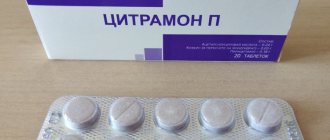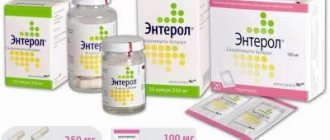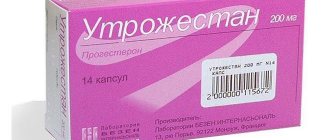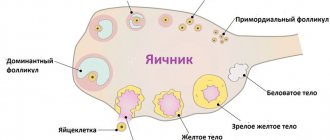Headaches are familiar to every woman, and during pregnancy they occur more frequently and can be quite intense. The vascular system of the fair sex carrying a child undergoes changes, as does the hormonal background. Because of this, the load on the blood vessels increases, causing headaches more often. In addition, colds with increased body temperature and joint pain cannot be ruled out. In the absence of an “interesting situation,” ordinary painkillers would help eliminate the unpleasant symptoms. But is it possible to drink Citramon during pregnancy, will it harm the baby? This question arises in every woman when her general condition worsens.
The best option is to stop taking any medications. A headache can go away on its own, but sometimes it is so severe that it is better to take medicine than to torment yourself and your child. Toothache will not go away on its own; in this case, Citramon is necessary during pregnancy to reduce it before visiting the dentist. Let's try to figure out whether it is possible to take Citramon during pregnancy and in what cases.
Description of Citramon
Citramon is a widely known combined non-narcotic analgesic with pronounced analgesic, antipyretic, and anti-inflammatory effects.
Currently, the medicine is not produced according to the classic recipe due to the ban on the use of one of the substances - phenacetin. It was withdrawn from circulation due to high nephrotoxicity.
Now the composition of the drug from different manufacturers, while maintaining the main active ingredients, differs slightly in their concentration. The most common is Citramon P.
Active ingredients of this drug:
- 0.24 g acetylsalicylic acid;
- 0.18 g paracetamol;
- 0.03 g caffeine.
Excipients include citric acid, talc, cocoa, and potato starch.
In Citramon Borimed tablets, the dosages of these substances are different: 0.22 g, 0.2 g, 0.027 g, respectively. In the drug Citramon Forte the concentration is higher - 0.32 g, 0.24 g, 0.04 g. There is Citramon Ultra, which differs favorably from its “brothers” by the presence of a film shell that makes it easier to swallow and protects the stomach from the irritating effects of substances.
Composition of the drug
One Citramon tablet contains three active ingredients: 240 mg of acetylsalicylic acid (ASA), 180 mg of paracetamol and 30 mg of caffeine.
Additionally, the composition includes cocoa powder, citric acid monohydrate and potato starch. Acetylsalicylic acid (ASA) blocks the body's production of enzymes called cyclooxygenases, which reduce the production of prostaglandins. The achieved effect reduces pain, reduces swelling and redness in the inflamed area. Additionally, ASA affects pain and thermoregulation centers in the brain.
The drug relieves fever in systemic infectious processes. Acetylsalicylic acid has an antiplatelet effect, causing blood thinning and preventing the formation of blood clots.
Attention! During pregnancy, Citramon is allowed to be used only from 14 to 28 weeks of pregnancy and after consultation with a specialist.
The second active ingredient of Citramon is Paracetamol. The drug belongs to the class of anti-inflammatory drugs and has a similar mechanism of action. Paracetamol, unlike ASA, has a greater effect on thermoregulation than on relieving pain, swelling and redness.
The third component of the drug is Caffeine, which belongs to the class of nervous system stimulants. The drug stimulates the respiratory center, helps to expand the lumen of the diameter of blood vessels, and improves mental activity. Caffeine enhances the effect of the other components of the drug due to its positive effect on cerebral circulation.
The drug is absorbed by the mucous membrane of the stomach and upper intestines. The maximum concentration of Citramon in the blood is observed 90-110 minutes after administration. The components of the drug are processed in the liver and leave the body through the urinary system. A small part of the drug is excreted in the feces.
The principle of action of Citramon
Acetylsalicylic acid is a non-steroidal anti-inflammatory drug. It relieves inflammation, reduces platelet aggregation, has antipyretic properties, and can reduce pain caused by the inflammatory process. Frequent use and/or large doses of Aspirin can lead to the formation of erosion or ulcers of the stomach and duodenum, cause nausea, bleeding, and affect the functioning of the expectant mother's liver and kidneys.
Paracetamol affects the thermoregulation center and inflammation processes, thereby quickly reducing high body temperature and reducing inflammation. It is relatively safe for the fetus.
Caffeine is not recommended for use during pregnancy, but it is included in Citramon in small dosages. The drug prevents platelet aggregation, stimulates the respiratory and vasomotor centers, relieves fatigue and drowsiness, increases mental and physical activity, dilates the blood vessels of skeletal muscles and muscle tissue of internal organs, while constricting the blood vessels of the brain.
Pharmacokinetics
In order to understand whether Citramon can be taken during pregnancy and what danger it poses, let’s consider its mechanism of action.
Acetylsalicylic acid, which is part of Citramon, due to the characteristics of its chemical formula, is quickly absorbed by the gastrointestinal mucosa. It easily penetrates into various physiological fluids: cerebrospinal, peritoneal, synovial, easily overcomes the transplacental barrier, binding to blood plasma proteins, and is detected in large quantities in breast milk during lactation. It is excreted primarily by the kidneys. In newborns, the elimination of salicylates is much slower than in adults.
The main mechanism for the pronounced therapeutic effect when taking Citramon and other drugs containing acetylsalicylic acid is associated with blocking the production of prostaglandins by the body.
What are prostaglandins needed for?
Prostaglandins are special compounds of unsaturated fatty acids that are necessary for the normal functioning of the liver and kidneys, are mediators of inflammation, regulate vascular tone, microcirculation, providing nutrition and oxygenation of body tissues. Prostaglandins are needed to ensure normal hormonal balance and tissue differentiation. With their help, all hormone-dependent processes occur, including pregnancy and lactation.
Prostaglandins are necessary for the process of conception and implantation of a fertilized egg. They play a key role during labor and, together with other hormones, enhance the contractility of the myometrium during childbirth. Thanks to prostaglandins, the required volume of blood flow to the placenta is maintained and the fetus is provided with the necessary nutrients.
By blocking the synthesis of prostaglandins, Citramon P can have a negative effect on pregnancy, the development of the embryo and fetus.
Is it possible to take Citramon during pregnancy?
The components of the drug reinforce each other, giving together a good therapeutic effect, therefore Citramon P during pregnancy is allowed to be taken in the 2nd and, in exceptional cases, in the 1st and 3rd trimesters, if the benefit to the mother outweighs the risk of complications in the fetus. But the use of the product should be strictly limited, since there are risks of serious complications.
Before taking medication, you first need to determine the cause of your headaches. This can be from either low or high blood pressure. For pain from low A/D, taking Citramon during pregnancy relieves it by narrowing the cerebral vessels. If you have a headache due to high blood pressure, then caffeine will only make the situation worse.
Use of Citramon in the 1st trimester
Citramon is contraindicated in early pregnancy, especially in the first 12 weeks. Aspirin, which is part of it, thins the blood, increasing the risk of bleeding, which is dangerous for both mother and fetus. With increased tone of the uterus and weak blood vessels of the placenta, a pregnant woman may experience uterine bleeding, which will lead to a lack of nutrition and oxygen in the child, which can lead to disturbances in its intrauterine development. Read more about the dangers of fetal oxygen starvation →
The effect of aspirin can lead to Reille's syndrome, which manifests itself in a child as uncontrolled convulsive contractions of one or two fingers of the limbs due to circulatory problems. The result of this can be gangrene or even the death of the baby. Another serious developmental anomaly is a cleft palate.
Acetylsalicylic acid is one of the causes of fetal malformations. In the early stages, the formation of all systems and organs of the embryo occurs. Aspirin can disrupt these processes, resulting, for example, in skeletal underdevelopment.
Caffeine slows down intrauterine development of the fetus and stimulates cardiac activity, increasing the frequency of contractions. It also increases blood pressure, which negatively affects the mother, because her blood vessels and kidneys are working under strain. Taking Citramon in the early stages of pregnancy can lead to miscarriage.
Taking Citramon in the 2nd trimester
This is the most favorable period of the entire gestation period. The development of systems and organs in the embryo is complete, and the mother feels better. But if there is a need to use Citramon, then the dosage and frequency of administration must be agreed with the doctor.
Use of Citramon in the 3rd trimester
The load on the circulatory system increases, headaches may become more frequent and intense. But you can’t drink Citramon in late pregnancy, because the effect of one of its components is to reduce the amount of prostaglandins. They stimulate uterine activity, preparing the body for childbirth, so a reduction in these hormones can lead to the fading of pregnancy, seriously complicate the process of labor or extend the period, causing post-term pregnancy.
The action of Citramon leads to the closure of the ductus arteriosus in the fetus. As a result, he develops pulmonary vascular hyperplasia, accompanied by an increase in pressure in the vessels of the pulmonary circulation.
Second trimester
In the second trimester of pregnancy, when the organs and tissues of the fetus are already formed, and there is still some time before birth, it is theoretically possible to use Citramon. However, it is necessary to take into account and correctly assess the possible risks and benefits for the mother and child when prescribing the drug. Is it possible to take Citramon P during pregnancy, in the second trimester, the doctor decides. In case of severe pain, increased body temperature, or ineffectiveness of other medications, you can take Citramon. However, taking the drug should not be long-term.
Indications for use of Citramon during pregnancy
Citramon during pregnancy is prescribed only in extreme cases, provided that the benefit to the mother outweighs the risk of consequences to the fetus.
These indications are:
- cephalalgia – headaches (drink with low A/D);
- myalgia – muscle pain;
- arthralgia – joint pain;
- odontalgia – toothache;
- neuralgia – pain along the affected peripheral nerves;
- fever due to a viral infection or cold.
Reviews from women
I took Citramon during my first B, everything was fine, doctors didn’t recommend anything other than No-shpa, but it was useless to me.
Katerina https://www.baby.ru/community/view/22562/forum/post/170840487/
The gynecologist told me that it is better to eat a Citramon tablet than to endure a headache. Naturally, not on a permanent basis. Maybe I took it 2-3 times during pregnancy.
L'Hopital https://deti.mail.ru/forum/v_ozhidanii_chuda/beremennost/citramon_pri_beremennosti/
My gynecologist just advised me to drink Citramon, No-shpa (in my opinion, it is completely useless for headaches), Nurofen and Panadol. In the first trimester I had headaches that did not go away for several days! That is, in the morning my head started to hurt, it didn’t go away all day, then I suffered all night and couldn’t sleep from the pain, the next day it hurt too... When I told the doctor, she was horrified and said that you can’t tolerate a headache, especially this kind strong. Since then I have been taking half a Citramon tablet. True, one time I had to drink 2 at once, because the headache was simply terrible. In the second trimester, the pain almost stopped, but sometimes the headache still returned. I drank Citramon, half a tablet or a whole one if I can’t bear it.
Natasha https://www.tiensmed.ru/news/citramonus2___2.html
But I just took Citramon during pregnancy. I thought he was completely harmless. It turns out that he is very dangerous. But many years have passed since then. My baby is completely healthy. He doesn't have any syndromes. So it was just luck then. Yes, I didn’t take it often or in large quantities. Sometimes one pill, that's all. Now I’m already afraid of this Citramon. And I don't buy anymore. Since it is harmful, why poison the body.
Alla https://www.tiensmed.ru/news/citramonus2___3.html#comments
I took Citramon during both pregnancies, but tried to take half of it. Both children are normal. I don't think it will do much harm.
Menni https://www.stranamam.ru/post/413041/
Contraindications
Citramon should not be taken in the following cases:
- individual intolerance to one of the components of the product;
- risk of miscarriage;
- “aspirin” asthma;
- 1st and 3rd trimesters of pregnancy;
- reduced level of prothrombin in the blood, i.e. poor coagulation - hypoprothrombinemia;
- breastfeeding period;
- deficiency of vitamin K and/or glucose-6-phosphate dehydrogenase;
- glaucoma;
- hemorrhagic diathesis;
- portal or arterial hypertension.
You should drink Citramon with extreme caution in the 2nd trimester, especially with erosive and ulcerative processes of the stomach and duodenum, or a history of liver and intestinal diseases.
Analogues of Citramon and other drugs for headaches for pregnant women
Citramon analogues are medicines that contain the same active ingredients as Citramon.
In addition to analogues, the doctor may recommend other drugs that differ in composition, but have a good analgesic effect.
Analogues of Citramon - table
| Name | Release form | Use during pregnancy |
| Askofen-P | pills | Use in the first and third trimester is contraindicated; in the middle of pregnancy, a single dose of the drug in recommended doses is possible only if the expected benefit to the mother does not exceed the potential risk to the fetus. |
| Cofficil-plus | Contraindicated for pregnant women according to instructions. If use is necessary, the ratio of the benefits of treatment for the mother and the existing risk to the fetus must be weighed. | |
| Excedrin | Despite the fact that acetylsalicylic acid can be used in the second trimester of pregnancy, the safety of this combination in expectant mothers has not been studied. According to the instructions, the drug is contraindicated in pregnant women, and if use is necessary, the ratio of the benefits of treatment for the mother and the existing risk to the fetus must be weighed. | |
| Migrenol | Use with caution during pregnancy and breastfeeding. |
Painkillers to replace Citramon - table
| Name | Active substance | Release form | Contraindications | Use during pregnancy |
| Paracetamol | paracetamol |
|
| Paracetamol penetrates the placental barrier, but so far no negative effects of the drug on the fetus have been observed. Experimental studies have not established the toxic and mutagenic effects of the antipyretic. If it is necessary to use it during pregnancy, you should carefully weigh the expected benefits of therapy for the mother and the potential risk for the child. |
| Panadol | paracetamol | pills | hypersensitivity | Use during pregnancy and breastfeeding is possible with caution and only under the supervision of a physician. |
| No-shpa | drotaverine hydrochloride |
|
| If it is necessary to use No-shpa during pregnancy, care should be taken and the drug should be prescribed only after assessing the ratio of potential benefits to the mother and possible risk to the fetus. |
| Ibuprofen | ibuprofen |
|
| According to the instructions, Ibuprofen is contraindicated during pregnancy. But sometimes doctors prescribe it as an antipyretic and analgesic. The drug cannot be used in the first and third trimester, and in the second only when strictly necessary and under the supervision of doctors. |
What is the best replacement for Citramon - photo gallery
Paracetamol - a remedy for fever and headaches
No-spa - universal tablets for pain and cramps
Ibuprofen is another pain reliever that can be used during pregnancy.
Askofen-P - a drug for headaches, an analogue of Citramon
Panadol is an antipyretic and analgesic drug
Fighting headaches naturally
In the first trimester, the use of any medications is associated with risks, so the expectant mother should think about natural methods of combating headaches, such as:
Recent Entries
Is it possible to give a mirror: how to protect yourself from bad omens It became known about the influence of cell phone towers on human health Is it possible to eat bananas bought in Russia?
- dream;
- Fresh air;
- head massage;
- warm water;
- compresses with ice or cabbage;
- strong sweet tea.
Please note that in some cases, a headache can be a symptom of a serious illness, so a trip to the doctor is mandatory.
Instructions for use of Citramon during pregnancy
According to the instructions for use, doctors advise avoiding Citramon during pregnancy altogether, but if necessary (with the permission of a gynecologist or attending physician), a single dose of medication can be taken to relieve fever or pain. The dosage during pregnancy differs from the average therapeutic dosage under normal conditions, so the frequency of administration and dose will be advised by the doctor, based on the situation.
In the early stages of gestation, to relieve fever and relieve any pain syndrome, Citramon should be replaced with Paracetamol. It does not contain caffeine, which negatively affects the fetus. In recent months, instead of Citramon, you can take valerian infusion or tablets, relieve pain with an antispasmodic, for example, No-shpa. If your headache is caused by nervous tension, try a light massage of your neck and shoulder girdle.
Citramon during pregnancy, according to reviews from women who have carried a child, is better to take than Paracetamol or, especially, Analgin. Others have the opposite opinion. Some are categorically against medications and saved themselves with folk remedies, sleep, applying ice, walking, etc. Those who had to take Citramon note that this did not affect the child, he was born on time and healthy.
Each woman's body is individual, so before you decide to drink Citramon, be sure to consult a gynecologist.
Author: Nadezhda Martynova, doctor, especially for Mama66.ru
Release form and expiration date
The medicine is sold in tablet form. Citramon is available in contour packs of 6, 10 and 20 tablets. The shelf life of the medicinal product is 48 months from the date of manufacture. One Citramon tablet contains 240 milligrams of Acetylsalicylic acid, 180 milligrams of Paracetamol and 30 milligrams of Caffeine.
To preserve the therapeutic properties of the active ingredients of the drug, it is recommended to store the drug at a temperature not exceeding 24 degrees Celsius. Avoid exposure of the medication to sunlight. There is no need to use the drug after the expiration date. Do not leave the packaging of tablets in places accessible to children.









